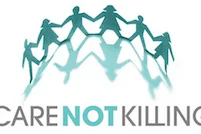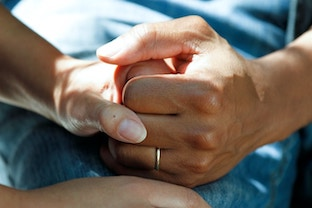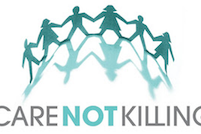Campaign protests at Court ruling to remove legal safeguard for brain-damaged patients

Care Not Killing has expressed "concern" and "disappointment" that the Supreme Court has removed an important safeguard from brain-damaged patients today.
Judges have ruled that doctors should be able to withdraw food and fluids without going to Court.
The ruling will effect up to 24,000 patients with permanent vegetative state (PVS) and minimally conscious state (MCS), meaning they can now be effectively starved and dehydrated to death if the medical staff and relatives agree that this is in their 'best interests'.
People with PVS (awake but not aware) and MCS (awake but only intermittently or partially aware) can breathe without ventilators, but need to have food and fluids by tube (clinically assisted nutrition and hydration or CANH).
These patients are not imminently dying and with good care can live for many years. Some may even regain awareness. But if CANH is withdrawn, then they will die from dehydration and starvation within two or three weeks.
Until last year all cases of PVS and MCS have had to go to the Court of Protection before CANH could be withdrawn.
Campaign Director of Care Not Killing, Dr Peter Saunders, commented: "This is concerning and disappointing news, because it removes an important safeguard from those without a voice.
"The Court of Protection did not prevent clinically assisted nutrition and hydration or CANHbeing removed, indeed under the old rules, introduced after the Tony Bland case in 1993 there have been over 100 such cases, but it did ensure independent scrutiny of any application. It did this because it recognised the emotional and financial pressure that families and clinicians can fell under."
The ruling comes after two cases last year (known as M and Y). The High Court ruled that if the relatives and medical staff agreed that withdrawal of CANH was in the patient's 'best interests' then the court need not be involved.
The Official Solicitor appealed this decisionto the Supreme Court in a hearing in February. The Supreme Court has only just issued its judgement today effectively upholding the decision of the High Court.
Worryingly the Supreme Court has said that that there is no difference in principle between turning off a ventilator and removing a feeding tube as both are 'forms of medical treatment' and patients with PVS and MCS should be treated in the same way as people with 'severe stroke' a 'degenerative neurological condition' or 'other conditions with a recognised downward trajectory'.
Dr Saunders continued: "In making these declarations Lady Black and the Supreme Court has dramatically moved the goalposts on end of life decision-making. Once we accept that death by dehydration is in some brain-damaged people's 'best interests' we are on a very slippery slope indeed.
"There is a clear difference between turning off a ventilator on a brain-dead patient and removing CANH from a brain-damaged patient. PVS and MCS differ from conditions with a 'downward trajectory' because they are not progressive and do not in themselves lead inevitably to death.
"The Supreme Court has set a dangerous precedent. Taking these decisions away from the Court of Protection removes an important layer of legislative scrutiny and accountability and effectively weakens the law.
"It will make it more likely that severely brain-damaged patients will be starved or dehydrated to death in their supposed 'best interests' and that these decisions will be more influenced by those who have ideological or financial vested interests in this course of action."
Care Not Killing, also highlights the advances that being made in the treatment of some acute brain injury because of brain cooling techniques, intracranial pressure monitoring and neurosurgery, as a reason to be cautious in making this change.
While citing recent experiences around the Liverpool care pathway, and in the Gosport hospital, that should make us wary of leaving doctors without proper regulatory and legal oversight.
He concluded: "Given that it costs about £100,000 per year to care for a person with PVS or MCS the potential 'saving' for the NHS could be as much as £2.4 billion annually if most seek to go down this route. Given the huge and growing financial pressure the health service is under is this really an additional pressure, no matter how subtle we want to put medical staff and administrators under.
"Coupled with this are the real, demonstrable and significant uncertainties about diagnosis and prognosis in both PVS and MCS. These have increased rather than decreased in the last 20 years and this is why continued court oversight is necessary."
Care Not Killing is a UK-based alliance bringing together around 50 organisations - human rights and disability rights organisations, health care and palliative care groups, faith-based organisations groups - and thousands of concerned individuals.
It has three key aims:
• to promote more and better palliative care;
• to ensure that existing laws against euthanasia and assisted suicide are not weakened or repealed during the lifetime of the current Parliament;
• to inform public opinion further against any weakening of the law.
Read more about Care Not Killing: www.carenotkilling.org.uk
See also the Bishops' Conference of England and Wales response: www.catholic-ew.org.uk/Home/News/End-of-Life-decisions





















